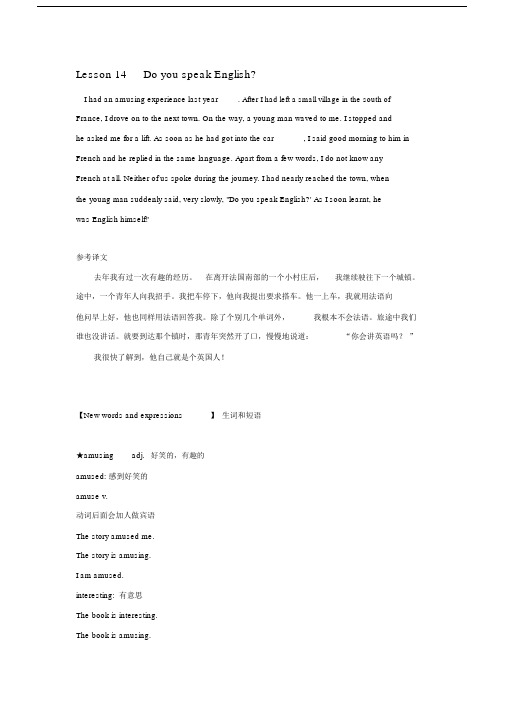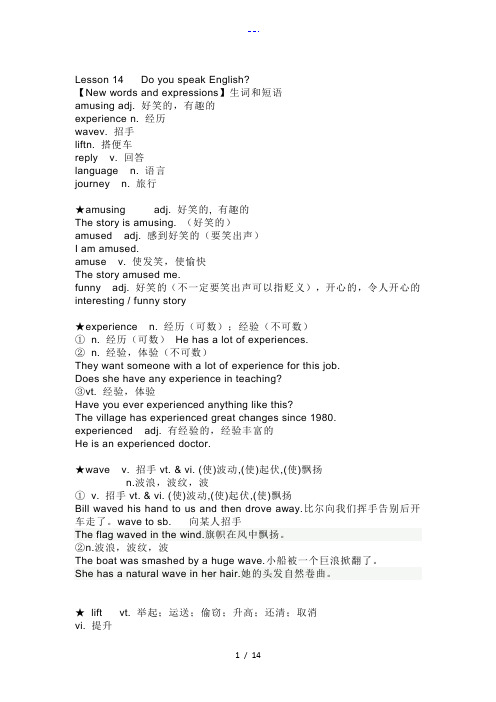新概念第二册第14课课文讲解
- 格式:doc
- 大小:65.50 KB
- 文档页数:8

Lesson 14 Do you speak English?I had an amusing experience last year. After I had left a small village in the south of France, I drove on to the next town. On the way, a young man waved to me. I stopped andhe asked me for a lift. As soon as he had got into the car, I said good morning to him in French and he replied in the same language. Apart from a few words, I do not know anyFrench at all. Neither of us spoke during the journey. I had nearly reached the town, whenthe young man suddenly said, very slowly, "Do you speak English?' As I soon learnt, hewas English himself!'参考译文去年我有过一次有趣的经历。
在离开法国南部的一个小村庄后,我继续驶往下一个城镇。
途中,一个青年人向我招手。
我把车停下,他向我提出要求搭车。
他一上车,我就用法语向他问早上好,他也同样用法语回答我。
除了个别几个单词外,我根本不会法语。
旅途中我们谁也没讲话。
就要到达那个镇时,那青年突然开了口,慢慢地说道:“你会讲英语吗?”我很快了解到,他自己就是个英国人!【New words and expressions】生词和短语★amusing adj.好笑的,有趣的amused: 感到好笑的amuse v.动词后面会加人做宾语The story amused me.The story is amusing.I am amused.interesting: 有意思The book is interesting.The book is amusing.funny: 好笑的,可以指,开心的,令人开心的interesting/funny story★experience n.、体:不可数名、感受:可数名He has a lot of experience. He has a lot of experiences.Experience is the best teacher .是最好的老。

Lesson 14 Do you speak English?【New words and expressions】生词和短语amusing adj. 好笑的,有趣的experience n. 经历wavev. 招手liftn. 搭便车reply v. 回答language n. 语言journey n. 旅行★amusing adj. 好笑的, 有趣的The story is amusing. (好笑的)amused adj. 感到好笑的(要笑出声)I am amused.amuse v. 使发笑,使愉快The story amused me.funny adj. 好笑的(不一定要笑出声可以指贬义),开心的,令人开心的interesting / funny story★experience n. 经历(可数);经验(不可数)①n. 经历(可数)He has a lot of experiences.②n. 经验,体验(不可数)They want someone with a lot of experience for this job.Does she have any experience in teaching?③vt. 经验,体验Have you ever experienced anything like this?The village has experienced great changes since 1980.experienced adj. 有经验的,经验丰富的He is an experienced doctor.★wave v. 招手vt. & vi. (使)波动,(使)起伏,(使)飘扬n.波浪,波纹,波①v. 招手vt. & vi. (使)波动,(使)起伏,(使)飘扬Bill waved his hand to us and then drove away.比尔向我们挥手告别后开车走了。




裕兴新概念英语第二册复习笔记第十四课课文讲解I had an amusing experience last year. After I had left a small village in the south of France, I drove on to the next town. On the way, a young man waved to me. I stopped and he asked me for a lift. As soon as he had got into the car, I said good morning to him in French and he replied in the same language. Apart from a few words, I do not know any French at all. Neither of us spoke during the journey. I had nearly reached the town, when the young man suddenly said, very slowly, "Do you speak English?' As I soon learnt, he was English himself!'去年我有过一次有趣的经历。
在离开法国南部的一个小村庄后,我继续驶往下一个城镇。
途中,一个青年人向我招手。
我把车停下,他向我提出要求搭车。
他一上车,我就用法语向他问早上好,他也同样用法语回答我。
除了个别几个单词外,我根本不会法语。
旅途中我们谁也没讲话。
就要到达那个镇时,那青年突然开了口,慢慢地说道:“你会讲英语吗?”我很快了解到,他自己就是个英国人!1. I had an amusing experience last year.leave1) v. 离开leave England for a tour of the world 离开英国去做一次环球旅行leave for England 离开去英国leave Shanghai 离开上海leave for Shanghai 离开去上海2) 辞去,退学eg. He left his job for a better one. 他辞去工作目的是为了找个更好的。
新概念英语第二册:第14课课文详解及语法解析课文详注 Further notes on the text1.After I had left a small village in the south of France, I drove on to the next town.在离开法国南部的一个小村庄后,我继续驶往下一个城镇。
(1)表示一个大范围中的某一个地方时要用介词in:Beijing is in the north of China.北京位于中国的北部。
(2)副词on紧跟在动词后面时能够表示“向前”、“继续下去”等意义:He talked on until everybody had gone.他滔滔不绝地讲到大家都走了。
I was reading when my friend called. After he had gone,I went on to read.我朋友来看我时我正在看书。
他走了以后我便继续看书。
2.I stopped and he asked me for a lift.我把车停下,他向我提出要求搭车。
名词lift的含义之一是“(给步行者)搭便车”、“免费搭车”:Last night, I had to walk home. No one would give me a lift.昨晚我不得不走回家。
谁也不愿意让我搭车。
I was lucky today. I got a lift soon after I had leftthe village.我今天运气好,离开村子不久就搭上了便车。
3.As soon as he had got into the car, I said goodmorning to him in French and he replied in the same language.他一上车,我就用法语向他问早上好,他也同样用法语回答我。
(1)表示时间的固定短语as soon as通常表示“一……就……”,即两个动词之间相隔时间非常短:Tell him the news as soon as you meet him.你一遇见他就把这消息告诉他。
Lesson 14 Do you speak English?I had an amusing experience last year. After I had left a small village in the south of France, I drove on to the next town. On the way, a young man waved to me. I stopped and he asked me for a lift. As soon as he had got into the car, I said good morning to him in French and he replied in the same language. Apart from a few words, I do not know any French at all. Neither of us spoke during the journey. I had nearly reached the town, when the young man suddenly said, very slowly, "Do you speak English?' As I soon learnt, he was English himself!'参考译文去年我有过一次有趣的经历。
在离开法国南部的一个小村庄后,我继续驶往下一个城镇。
途中,一个青年人向我招手。
我把车停下,他向我提出要求搭车。
他一上车,我就用法语向他问早上好,他也同样用法语回答我。
除了个别几个单词外,我根本不会法语。
旅途中我们谁也没讲话。
就要到达那个镇时,那青年突然开了口,慢慢地说道:“你会讲英语吗?”我很快了解到,他自己就是个英国人!【New words and expressions】生词和短语★amusing adj. 好笑的,有趣的amused:感到好笑的amuse v.动词后面会加人做宾语The story amused me.The story is amusing.I am amused.interesting:有意思The book is interesting.The book is amusing.funny:好笑的,可以指贬义,开心的,令人开心的interesting/funny story★experience n. 经历经验、体验:不可数名词经历、感受:可数名词He has a lot of experience. He has a lot of experiences.Experience is the best teacher. 经验是最好的老师。
Lesson 14 Do you speak English?I had an amusing experience last year. After I had left a small village in the south of France, I drove on to the next town. On the way, a young man waved to me. I stopped and he asked me for a lift. As soon as he had got into the car, I said good morning to him in French and he replied in the same language. Apart from a few words, I do not know any French at all. Neither of us spoke during the journey. I had nearly reached the town, when the young man suddenly said, very slowly, "Do you speak English?' As I soon learnt, he was English himself!'参考译文去年我有过一次有趣的经历。
在离开法国南部的一个小村庄后,我继续驶往下一个城镇。
途中,一个青年人向我招手。
我把车停下,他向我提出要求搭车。
他一上车,我就用法语向他问早上好,他也同样用法语回答我。
除了个别几个单词外,我根本不会法语。
旅途中我们谁也没讲话。
就要到达那个镇时,那青年突然开了口,慢慢地说道:“你会讲英语吗?”我很快了解到,他自己就是个英国人!【New words and expressions】生词和短语★amusing adj. 好笑的,有趣的amused:感到好笑的amuse v.动词后面会加人做宾语The story amused me.The story is amusing.I am amused.interesting:有意思The book is interesting.The book is amusing.funny:好笑的,可以指贬义,开心的,令人开心的interesting/funny story★experience n. 经历经验、体验:不可数名词经历、感受:可数名词He has a lot of experience. He has a lot of experiences.Experience is the best teacher. 经验是最好的老师。
They still lacked experience. 他们经验还不足。
Something about your background and experience. 谈谈你的背景情况和经历。
+s(a/an),经历;原形,经验experienced:有经验的He is an experienced doctor.表示做某事的经验,其后通常不接不定式,而接in [of] doing sth。
He has had much experience in [of] this kind of work. 他有丰富的经验做这项工作。
experiece in [of] teaching=teaching experience(教学经验)experience还可表示“体验”“经历”等,只用作及物动词。
All children will experience fun and excitement in learning and growing up.在学习和成长中的所有儿童都将感受到快乐和兴奋。
The child had never experienced kindness. 这孩子从未受过善待。
词语扩展:experienced作形容词,表示有经验的。
例句:He is an experienced teacher.他是一位经验丰富的老师。
★wave vt. 向…挥手示意;使成波浪形vi. 波动;起伏;挥手示意;摇动;呈波形wave to sb;向某人招手The children waved to their teacher. 孩子们向老师招手。
★lift n. 搭便车vt. 举起;提升I was a lift.take a bus/taxi/lifttake a lift:搭便车I take a list.The student gave me a lift.give sb a lift:让某人搭便车I will give you a lift to the airport.我可以顺便送你去机场。
B wants to take a lift.A will giveB a lift.hitch hiker:搭便车的人lift sb. /sth. up 将某人/某物抬起He lifted the box. 他举起了箱子。
★reply v. 回答answerHe answered/replied.answer sth/reply to sth.answer the letter:回信I will reply to the letter.★language n. 语言native language:母语mother tongueThe native language is Chinese.My mother tongue is Chinese.★journey n. 旅行begin a trip:开始一个旅行begin a journeytrip,travel,tourtrip:短距离旅行或出差go on business/go on a triptravel:周游(长途)tour,为了玩tourist:游客journey:所有的旅行go on a journey, 3 days' journey2 hours' journeyvoyage:旅行(海上)flight:空中飞行journey:偏重于陆地旅行trip;travel;tour;journey;voyage;flight【notes on the text】●I drove on to the next town. 我继续驶往下一个城镇。
句中的副词on 有“继续地”“不停顿的”的意思。
He can work on without a break. 他能不停地工作。
●in the south of表达方位的表达方式一共有3个介词,in,on,to没有相接的,是相离的,to接壤,on在什么里面,in●On the way 在途中,即将发生in the way在路上,在途中挡住去路in a way 在某种程度上in this way 这样by the way顺便提一下,另外by way of通过…方法;经由give way让路,让步;撤退in every way在各方面,以各种方式in no way决不,一点也不in the way of妨碍;在…方面,关于lead the way引路,带路;示范make way让路;开路;进展make one's own way成功,发迹make one's way前进,前往,行进under way在进行中,前进着●as soon as:一...就...户名一定要加一个句子(时间主语从句),后面的先发生As soon as I had received the letter,I ringed/called him back.只要是状语从句,一旦遇到将来时,变为一般现在时As soon as you arrive,you must call me.As soon as 强调两个动作几乎是连在一起的●Ask for a lift 要求搭车搭便车:take a lift给某人搭便车:give sb a lift●Apart from 除了.....之外Except They were all there except me. 除了我以外他们都在那里。
except for含有对整体中的某一个方面不满意Except for his height,he is very excellent.The article is very good except for his handwriting.Besides She has so much else to do besides doing her homework.除了做她的作业外她还有许多其他的事情要做。
in addition to He speaks French in addition to English.他除了说英语之外,还会说法语。
I invited everyone except George. Except for George I invited everyone.Except for/apart from this,everything is in order.●not at all:一点点都不I don't like it. I don't like it at all.●neitherduring the journey:在旅途当中,自始自终neither of sb,either of sbeither of sb:什么当中的任何一个neither of sb:什么当中的任何一个都不either,neither 都是指两个当中的任何一个如果不只两个人,就变成none of●As I soon learnt, he was English himself! 我很快就知道,他自己就是一个英国人。
As+主语+动词+逗号+句子,As:正如As I think,it is the coldest day in the year.As my mother said/As I heardAs he said,English is easy to learn.●himself,反身代词单独放在句尾,起强调作用I read English myself.I stopped=I stopped the car.ask sb for sth:请求某人要求得到什么东西say goodbye,say sorry,say hello,say good morning to him用某种语言:in+某种语言I speak English.I say a word in Chinese.reply 要想加宾语要加toin the smae languageas soon as:一...就...As soon as I had entered the room,I took off my coat at once.【Key structures】过去完成时过去完成时:过去的过去或两个动作都在过去,一个动作在前,一个在后,发生在前的动作为过去完成时过去完成时一定要以一个过去时态在铺垫,这个动作一定要发生在had done之后After he had finished work he went home.The children ran away after they had broken the window.until:直到什么时候为止,直到什么时候才until,在后面一个从句之前发生了主句until,主句和从句两个都用一般过去时对,主句和从句然后一个用过去完成是也对I had not understood the problem until he explained it.after后面会加过去完成时,before后面会加一般过去时【Special difficulties】a.ask and ask forask sth:问什么什么东西,ask a question/ask sbask for sth:要求得到,ask for the answerc.which of ,either of, neither of ,both ofeither of :两者当中的任何一个neither of:两者都不which of :那一个,which of the twoboth of:两者都Which of the two do you like?I want both of them.I want either of them.I want neither of them.【Multiple choice questions】6.I speak a few words of French. I don't know ______French. ...b...A. ManyB. MuchC. Plenty ofD. A littleFrench不可数,不能用manyplenty of:足够多的not much: a littlenot a little: much7.Neither of us spoke. We ______ ...c....A. Neither spoke C. Either spoke C. Both didn't speak D. Neither didn't speak neither不会和not连用either:任何一个both:两个都neither of,不能说we neither,只能说neither of us9.The young man waved the writer. He _____him. ....c....A. SalutedB. GreetedC. Signalled toD. noddedsalute:n. 致敬,欢迎;敬礼Greet vt. 欢迎,迎接;致敬,致意;映入眼帘Signal vt. 用信号通知;标志10.He asked for a lift. He was a _______ ..b...A. TrampB. Hitch hikerC. PassengerD. Foreignertramp:流浪汉hitch hiker:搭便车的人passenger:乘客,付车钱12.The writer had ______ reached the town when the young man spoke.A. OftenB. AlmostC. SometimesD. Just asalmost=nearlyjust as 正当...时候+时间主语。